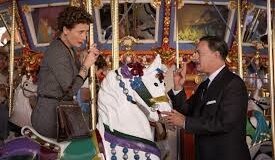|
|
| |
 |
| |
| Released: |
2013 |
| |
|
| Genre: |
DRAMA
BIOPIC
COMEDY
|
| |
|
| Origin: |
US |
| |
|
| Colour: |
C |
| |
|
| Length: |
125 |
|
| |
|
| |
|
|
| |
|
|
Too many spoonfuls of sugar.
|
Reviewed by Chris Tookey
|
According to Mary Poppins, a spoonful of sugar makes the medicine go down. On the evidence of this movie about the making of Mary Poppins, a vatful of saccharine is enough to make anyone throw up.
Saving Mr Banks is the latest schmaltzfest by director John Lee Hancock, who made The Blind Side an Oscar-winner for Sandra Bullock.
I’d have admired it a whole lot more if I hadn’t read P.L. Travers’ Mary Poppins novels as a child, and cordially disliked what the Disney corporation did to them.
Anyone who knows anything about the two leading characters, Travers and Disney, may also smell numerous rats in the company’s shameless Disneyfication of its own history.
It must be admitted that as wholesome, mainstream entertainment, Saving Mr Banks is pretty enjoyable.
It has three big things in its favour. Emma Thompson (pictured left) gives a splendidly imperious performance as P.L.Travers, the cantankerous author of Mary Poppins.
Tom Hanks (pictured right) is twinkliness incarnate as Walt Disney, the benevolent father-figure who made a hit movie out of her book and (according to the film) cured her writer’s block. Any notion that Walt might have been a bigoted, racist anti-Communist is carefully airbrushed out. The only sin it acknowledges in him is that he did, occasionally, smoke.
The film’s third big asset is that there remains a good deal of residual affection for that 1964 movie, especially among those who saw it as uncritical children. I even know one normally sane critic who didn’t mind Dick van Dyke’s excruciating cockney accent. Yes, I mean you, Mark Kermode.
It does trouble me that according to the film P.L. Travers was a frigid spinster with an unhealthy crush on her dead, alcoholic father (played in rather too many gold-tinted flashbacks by Colin Farrell). Not only does this smack of psychobabble; it utterly fails to explain why she was so hostile to having her books interfered with.
In reality, Travers was far from hidebound by her past and a very different character: a lusty bisexual who lived openly with a woman, adopted a child when she was 40 and wasn’t averse to extra-marital affairs.
The movie also suggests she suffered from writer’s block, cured by the magical touch of Disney. On the contrary, she was a prolific author who had successes with several more books after Mary Poppins, including seven sequels, three of them written before the year in which this film is set, 1961.
Even the premise of the plot conflict is a distortion. Travers had already signed over the rights to Disney before she arrived in America. She was not in a position to argue with the studio head as she does in the film. And Disney himself was never personally involved in the script process.
Perhaps more importantly, her belief that Walt Disney was vulgarizing her books was far from delusional. She was, for example, right to think that casting Dick van Dyke as a cockney chimneysweep was absurd.
Far from being won round by Disney to the company’s movie creation, she remained implacably hostile to it. The film suggests she wept tears of joy at the premiere. Her own memoir records that she wept out of anger and frustration:
”As chalk is to cheese, so is the film to the book. Tears ran down my cheeks because it was so distorted. I was so shocked I felt that I would never write – let alone smile – again”
Her will insisted that no Americans should be involved in any stage musical remake – not even the Sherman brothers, who wrote the catchy musical numbers which really did add something of value to her original.
Where the film is accurate is in showing the movie as the answer to Travers’ financial problems. She was paid $100,000 for the screen rights, plus 5% of the gross, which made her a multi-millionairess.
Do any of the film’s inaccuracies matter? Probably not to the moviegoing public, who will merely enjoy the performances and find this a charmingly sentimental story, elegantly filmed. But they mattered to me.
Read the Mary Poppins books and they are far darker, more dangerous and infinitely more subversive than Disney allowed them to be. They are not prim or proper. They are unconventional. They are magical. Travers may not have been easy to work with, but she was clear-sighted about the extent to which the 1964 film of Mary Poppins is not so much Travers as a travesty.
It may be old-fashioned of me, but I usually side with artistic integrity against commercial greed – which may be why I can not warm to a film with all the depth and sincerity of a corporate PR handout.
|
|
|
